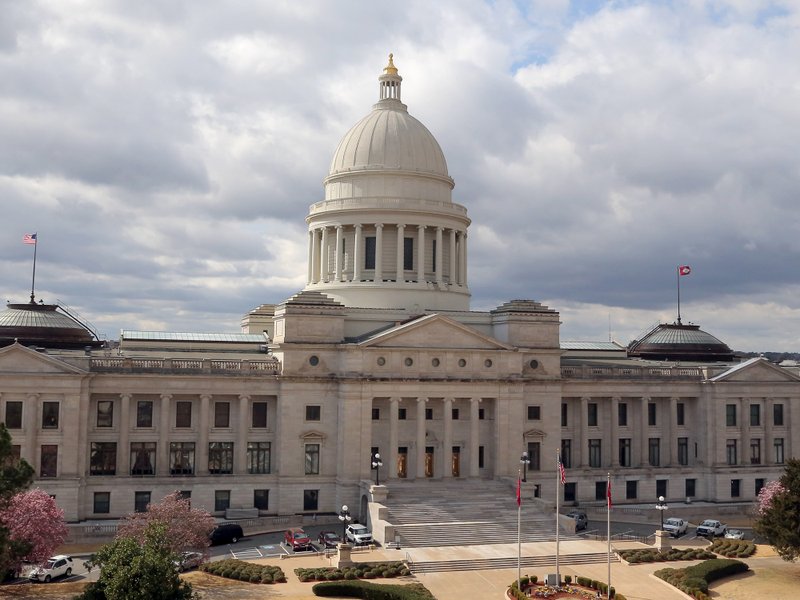Arkansas House and Senate committees on Tuesday advanced identical four-pronged tax cut bills that would accelerate the implementation of cuts in the state’s top individual and corporate income tax rates that are slated to be phased in during the next few years under current state law.
The measures also would grant a temporary nonrefundable income tax credit of $150 for individual taxpayers with net income up to $87,000 and of $300 for married taxpayers filing jointly with net income up to $174,000 and adopt a federal depreciation schedule for businesses.
With Rep. Denise Garner, D-Fayetteville, dissenting, the House Revenue and Taxation Committee on Tuesday afternoon voted to recommend the House approve House Bill 1002 by Rep. Joe Jett, R-Success. The House will consider the bill on Wednesday.
Jett told the House committee that "this is not just for the wealthy folks."
Taxpayers with net taxable income of $26,526 will get a tax cut of $365 in tax year 2022 under the measure, he said.
But Garner said she is concerned about the state having so many underfunded programs ranging from teachers to developmental disability care providers.
"It just seems like the timing is bad," she said.
Jett said the state would still have a projected general revenue surplus of roughly $400 million in fiscal year 2023, after factoring in the proposed tax cuts in House Bill 1002.
With Sen. Keith Ingram, D-West Memphis, dissenting, the Senate Revenue and Taxation Committee voted earlier Tuesday afternoon to recommend the Senate approve Senate Bill 1 by Sen. Jonathan Dismang, R-Searcy. The Senate will consider the bill on Wednesday.
The action came in the first day of the special session called by Gov. Asa Hutchinson. House Speaker Matthew Shepherd, R-El Dorado, said he hopes to wrap up the special session on Thursday morning.
The four-pronged tax cut package that Hutchinson and Republican legislative leaders have agreed upon for the special session is projected to reduce state general revenue by $500.1 million in fiscal 2023, $166.6 million more in fiscal 2024, $69.5 million more in fiscal 2025, $18.4 million more in fiscal 2026 and $8.4 million more in fiscal 2027, according to the state Department of Finance and Administration.
Hutchinson declined to put teacher raises on the call for the special session that he issued on Friday, citing the lack of support in the Republican-dominated Legislature for considering teacher pay raises in the special session. This action came after the governor, who is weighing a possible bid for president in 2024, surprised some lawmakers by floating proposals to boost teacher salaries in the special session.
Republican legislative leaders said they want lawmakers to consider increasing teacher pay during the 2023 regular session, starting Jan. 9, after the House and Senate education committees complete their biennial educational adequacy review this fall.
The tax package includes:
• Accelerating the implementation of cutting the state’s top individual income tax rate from 5.5% to 4.9%, retroactive to Jan. 1, 2022. The state’s top individual income tax rate is scheduled to be cut to 5.3% on Jan. 1, 2023, to 5.1% on Jan. 1, 2024, and to 4.9% on Jan. 1, 2025, under current state law.
The finance department projects that this proposal would reduce state general revenue by $295.9 million in fiscal 2023, $114 million more in fiscal 2024 and $39.15 million more in fiscal 2025 to eventually provide tax relief totaling $449 million a year.
• Accelerating the reduction in the state’s top corporate income tax rate to 5.3% on Jan. 1, 2023. Arkansas’ top corporate income tax rate of 6.2% dropped to 5.9% on Jan. 1, 2022. The rate is scheduled to drop to 5.7% on Jan. 1, 2023, to 5.5% on Jan. 1, 2024, and to 5.3% on Jan. 1, 2025, under current state law.
The finance department projects this proposal would reduce general revenue by $18.5 million in fiscal 2023, $27.8 million more in fiscal 2024, and $9.2 million more in fiscal 2025 to eventually provide $55.6 million a year in total tax relief.
• Granting a temporary nonrefundable income tax credit of $150 for individual taxpayers with net income up to $87,000 — with a phase out of the credit for filers having net income of up to $101,000 for tax year 2022 — and of $300 for married taxpayers filing jointly with net income up to $174,000 — with a phase out of the credit for filers having net income up to $202,000 for tax year 2022. These taxpayers will be required to be full-time residents of Arkansas to receive the tax credit.
The finance department projects this proposal will reduce general revenue by $156.3 million in fiscal 2023.
• Adopting the 2022 federal Section 179 depreciation schedule as it existed Jan. 1, 2022, which provides an income tax reduction for the expensing of certain property.
The federal Section 179 depreciation schedule allows businesses to deduct the entire purchase price of new or used equipment up to $1.08 million in 2022 rather than capitalizing and depreciating the asset over the designated useful life of the asset, said finance department spokesman Scott Hardin. The $1.08 million deduction is reduced dollar for dollar if asset purchases exceed $2.7 million for 2022, he said.
Arkansas previously adopted Section 179 as it existed on Jan. 1, 2009, and the dollar limitation on the deduction is $25,000 and the dollar-for-dollar phase-out starts at $200,000, he said. The federal limitation is adjusted for inflation each year, he said. Arkansas doesn’t plan on adopting federal bonus depreciation, which also allows 100% of the cost of equipment purchases to be written off when purchased, but does not have a maximum dollar limitation, he said.
The finance department projects this proposal would reduce general revenue by $29.4 million in fiscal 2023, $24.8 million more in fiscal year 2024, $21.1 million more in fiscal 2025, $18.4 million more in fiscal 2026 and $8.4 million in fiscal 2027.
